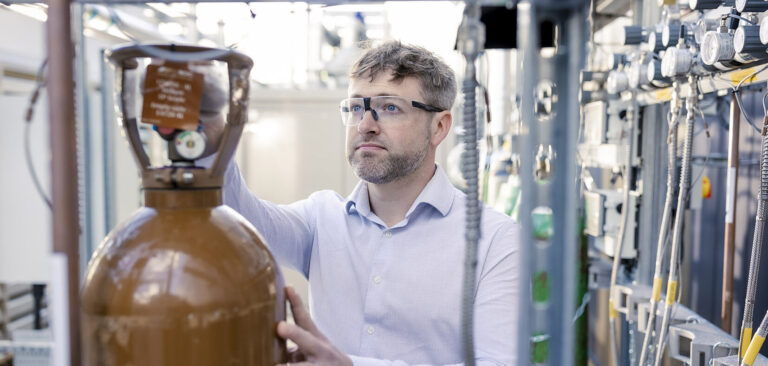The UK’s Coventry University Centre for Advanced Low Carbon Propulsion Systems (C-ALPS) has spent over £2m (US$2.67m) in creating a dedicated 100m2 lab and hydrogen compound that will enable it to develop hydrogen fuel cell-based powertrains through collaborative research and commercial contracts.
The project also involved the comprehensive upgrade of its powertrain test cells for running with hydrogen fuel systems and engineers at the £50m (US$66.87m) research center are now setting their sights on generating over £3m (US$4m) of projects every year.
Demand for the center’s expertise is expected to come from industrial companies who are keen to utilize a capability that can test ‘automotive’ scale fuel cells, with the recent investment also giving C-ALPS the opportunity to pipe in up to 300kW of hydrogen power. Furthermore, test benches have been installed to replicate real-world conditions and, more importantly, explore sub-components of bigger systems.
Simon Shepherd, director of the Centre for Advanced Low Carbon Propulsion Systems, commented, “There has been a lot of talk in the media recently about hydrogen power versus battery power and I don’t think it’s a constructive debate; if we are going to achieve the UK’s target of being net zero by 2050, we are going to need a blend of emerging clean technologies to meet the broad demands of the transport sector.
“Working in a center with expertise across batteries, hydrogen fuel cells and super-capacitors not only gives us deep insights into the relative attributes and challenges in each technology, it also provides unique opportunities for innovation and crossover between these disciplines.
“Our recent investment has ramped up our capability to take on more hydrogen fuel cell work, both on a commercial contract basis and via collaborative research projects. Both will accelerate the development of fuel cell technology towards viable mainstream adoption for heavy-duty vehicles and applications that require an extended range.
“The mix of academic and industrial capabilities we have within our team is unique and we now have the system, stack and cell-level testing facilities to exploit these skills to support companies to enhance the performance of their fuel-cell powertrains.”
C-ALPS has been working with the transportation sector to create cleaner mobility and develop the supply chain so that it can deliver technologies around battery systems, fuel cell development, power electronics and electric drive systems.
Global automotive engineering consultancy FEV is also involved in the development of the center. The initial investment from Coventry University in hydrogen facilities will be matched by FEV through plans to upgrade two further test cells to be capable of hydrogen-based powertrain testing at higher power levels.
Oliver Curnick, associate professor at C-ALPS and technical lead on hydrogen, said, “This latest investment in creating one of the largest hydrogen testing capabilities in the UK is a real show of commitment by Coventry University and puts us in an excellent position to gain a strong footing in the world of clean mobility.
“Decarbonizing transport – in all of its different forms – is going to take multiple solutions and there is definitely a role for hydrogen to play in supporting the powertrain requirements of larger vehicles, such as coaches, lorries, ships and aircraft. It’s not a case of one or the other, it’s about releasing the potential of all renewable energy sources by developing the means to deliver that energy to the point of use, at the right time, rate and cost.”


